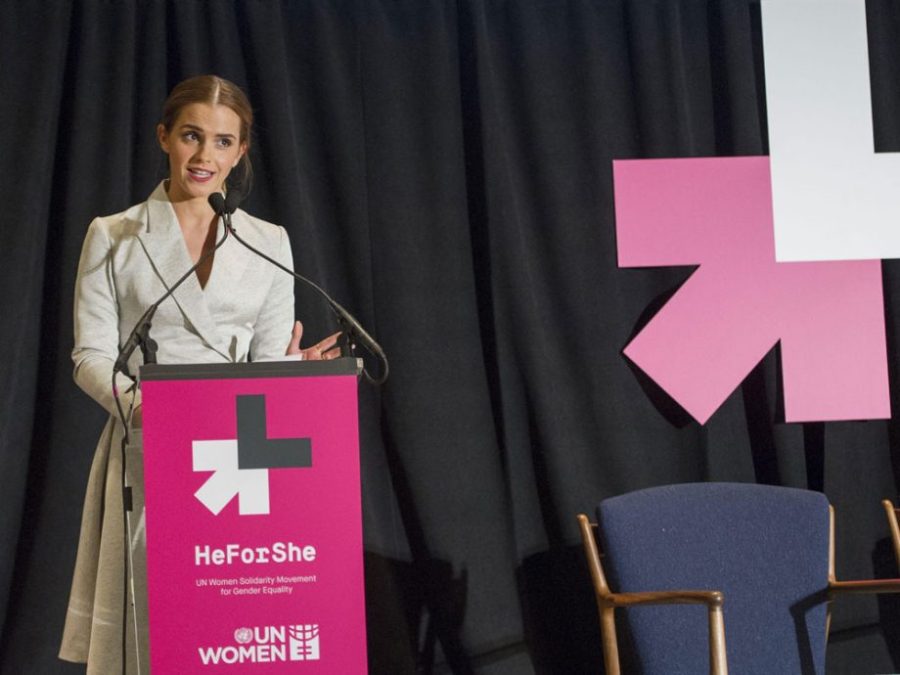Celebrities Advocate for Cultural Reexamination of Feminism
Actress Emma Watson speaks to the United Nations.
One of the most memorable pop culture moments of 2014 was Beyoncé’s mashup performance at the Video Music Awards Ceremony, where she projected on a huge screen that a feminist is “a person who believes in the social, economic and political equality of the sexes.” Beyoncé is regarded as a powerful role model for her ability to promote the values of empowerment and independence, which has caused a huge discussion about the role of celebrities in the feminist movement. Recently, a number of female celebrities — celebrities such as Emma Watson, Taylor Swift, and Shailene Woodley — have been weighing in on whether they identify themselves as feminists or not and how feminists should act in the modern world.
Specifically, is feminism as a movement necessary anymore, or is it just a way to appeal to women? To sell records? To fill seats at a movie theater?
Despite the popular notion that feminism is no longer necessary, sexism affects women every day in both personal and private spheres of life. Although the term “misogynist” is typically used to describe rapists and abusers, the word is far more inclusive. A misogynist is someone who hates or has prejudice against women, a definition that applies to a wide range of people from influential figures such as politicians to everyday people like high school students.
At Walpole High, 93% of the 83 surveyed students correctly identified that feminism is the belief that “women deserve the same rights and respect in society as men.” Of those students, only 54% of those students said that they supported feminism. When asked why she supports feminism, freshman Ellen Irmiter said, “As a female, I am aware that we are not given equal treatment to men and I strongly feel that we deserve better.”
However, many of students’ answers suggest ignorance regarding the movement despite efforts by people such as Beyoncé. For example, one anonymous student stated that he or she disagrees with feminism because “women belong in the kitchen,” while another said that “[feminists’] arguments are invalid.”
Actress Emma Watson gave a speech at a United Nations meeting about “HeForShe,” a campaign she founded in order to encourage men to join the feminist movement. She also pointed out a side of the feminist movement that many forget: men are also affected by sexism. For example, many men are afraid of acknowledging depression or eating disorders in fear of society labelling them as “girly” or “weak.”
“We want to try to galvanize as many men and boys as possible to be advocates for change,” Watson said of the campaign. What she spoke about was not particularly groundbreaking or demanding; instead, she asked simply for respect and equality for all women.
Watson stated, “[I think] it is right that as a woman I am paid the same as my male counterparts […] that I should be able to make decisions about my own body […] that women be involved on my behalf in the policies and decision-making of my country […] that socially I am afforded the same respect as men.” By explaining the goals of the feminist movement simply and concisely, Watson helped to remove some of the stigma against the movement and make it more approachable.
Additionally, Taylor Swift has undergone nothing short of a feminist transformation recently. In the past, Swift herself struggled with the idea because “[she] doesn’t really think about things as guys versus girls.” However, in a recent interview with “Tout Le Monde En Parle,” Swift said that had she wished she had heard a speech like Watson’s when she was a young girl.
“I would have understood [feminism] and then earlier on in my life I would have proudly claimed that I was a feminist,” Swift said. “I just think that a lot of girls don’t know the definition and the fact that Emma got up and explained it, I think it’s an incredible thing and I am happy to live in a world where that happened.”
Her statement encompasses much of the modern debate over feminism: many people do not identify with feminism simply because they do not understand what the word means. Swift proudly affirmed her new feminist label and stated that feminism is not about hating men at all; instead, it is about equality.
Although the celebrity feminist movement has an equally fierce opposition in people who disassociate with the label, many of their justifications are drawn from misinformation regarding what the movement entails. Perhaps most notably, actress Shailene Woodley told Time Magazine that she is not a feminist because she “[loves] men,” igniting a huge debate on whether or not she was misinformed or simply choosing not to label herself with the term. Perhaps the reaction regarding Woodley’s statement was so strong because she endorses feminism without ever actually using the word through her powerful roles in movies.
In addition to Woodley, a number of powerful female celebrities also refuse to identify as feminists, and the answers why they do not are almost universal: they do not hate men, and they believe the word has a negative connotation. Carrie Underwood says she is not a feminist but is simply a “strong female” while Lana Del Rey is “not interested” in the movement. Even former Supreme Court justice Sandra Day O’Connor refuses to call herself a feminist; she “[cares] very much about women and their progress” but prefers to call herself “a fair judge and a hard worker” rather than a feminist.
While a number of celebrities refuse to identify themselves as feminists because of negative connotations, the prominence of the celebrities who are choosing to identify with feminism are empowering their fans with a revitalized passion for gender equality.







